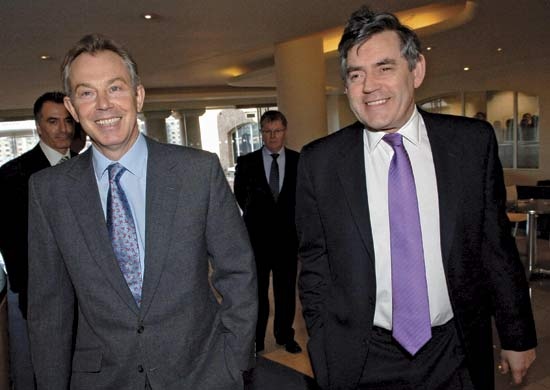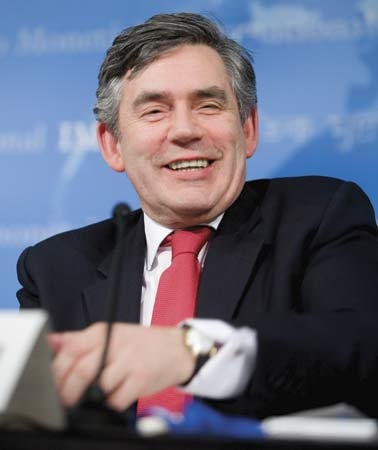Brown, Gordon
prime minister of United Kingdom
in full James Gordon Brown
born Feb. 20, 1951, Glasgow, Scot.
 Scottish-born British Labour Party politician who served as chancellor of the Exchequer (1997–2007) and prime minister of the United Kingdom (2007– ). At the time of his elevation to prime minister, he had been the longest continuously serving chancellor of the Exchequer since the 1820s.
Scottish-born British Labour Party politician who served as chancellor of the Exchequer (1997–2007) and prime minister of the United Kingdom (2007– ). At the time of his elevation to prime minister, he had been the longest continuously serving chancellor of the Exchequer since the 1820s.Brown was the son of John Brown, a Labour Party–supporting Church of Scotland minister, and Elizabeth Brown. At age 16 he won a scholarship to the University of Edinburgh (the youngest student to enter the university since World War II), where he immersed himself in student politics, eventually becoming chair of the university's Labour club. Having earned a degree with honours in 1972, he served as a university lecturer, first at Edinburgh (1975–76) and then at Glasgow College of Technology (now part of Glasgow Caledonian University; 1976–80). Brown left academia for an appointment at Scottish TV (1980–83), where he was a journalist and editor in the current affairs department. In 1982 he completed a doctorate in history at Edinburgh; his dissertation was entitled The Labour Party and Political Change in Scotland, 1918–29.
In 1974 Brown had helped organize the parliamentary campaign to elect Robin Cook, who would later serve in government with Brown as foreign minister (1997–2001) and leader of the House of Commons (2001–03). Brown himself unsuccessfully stood for election to the House of Commons in 1979 for a seat representing Edinburgh before winning a seat in Parliament in 1983 as MP for Dunfermline East. He became friends with Tony Blair (Blair, Tony), another new MP, and the two soon found themselves at the forefront of the campaign to modernize Labour's political philosophy, replacing the goal of state socialism with a more pragmatic, market-friendly strategy. From 1987 he served in Labour's shadow cabinet, first as shadow chief secretary to the Treasury and then as shadow trade and industry secretary. In 1992, following Labour's fourth successive electoral defeat, Brown was named shadow chancellor of the Exchequer by John Smith, then the Labour Party leader. Brown was widely regarded as the senior half of the Blair-Brown partnership and the one more likely to eventually become party leader. When Smith died in 1994, however, Blair had overtaken Brown as the favoured candidate of party activists and the wider public. Brown reluctantly agreed to step aside (reportedly at a meeting in Granita, a London restaurant), and in 1994 Blair won the party's leadership. Brown was subsequently reappointed by Blair as Labour's shadow chancellor.
In the 1997 general election, Labour won a landslide victory, and Blair became prime minister. Brown was subsequently named chancellor of the Exchequer, and he swiftly took control of almost all policies concerned with the United Kingdom's domestic economy. He immediately made his mark by ceding the power to set interest rates to the Bank of England (England, Bank of), and in October 1997 he announced a set of five key economic tests that would have to be met before Britain adopted the euro (he was generally considered more skeptical than Blair regarding Britain's joining the euro). Brown disappointed many Labour supporters by largely retaining for the first two years the strict public-spending policies he inherited from the Conservatives, but by July 1998 he had drawn up new plans that allowed for significantly more spending on health, education, and overseas aid, starting in 1999. In October 1998, as chairman of the Group of Seven's subgroup of finance ministers, Brown extended his influence and played a key role in helping to establish new international mechanisms to stabilize world financial markets. Under his leadership, Great Britain experienced a period of relatively steady economic growth, but increased public spending and government borrowing became growing concerns. Brown had a strong interest in international economics; he served as the United Kingdom's governor of the International Monetary Fund and as chair of the organization's primary decision-making committee and was instrumental in brokering a European agreement in 2005 that would double foreign aid to developing countries. He also set out a policy aimed at environmental sustainability, arguing that for too long economic priorities and environmental protection were seen as mutually exclusive and that instead “economic objectives and our environmental objectives now increasingly reinforce each other.”

 The relationship between Blair and Brown had grown somewhat strained, with many loyal to Blair claiming that Brown's supporters had been undermining Blair's leadership for several years (indeed, in June 2007 a leaked document surfaced showing that Blair had considered removing Brown as chancellor of the Exchequer after the 2005 election). In September 2006, shortly after the Labour Party fared poorly in location elections—blamed in part on the party's support of the Iraq War—Blair announced that he would step down as prime minister within a year. Brown subsequently pledged his support for Blair, and Blair in turn later backed Brown to succeed him as Labour Party leader and prime minister. Brown faced no opposition in the campaign to succeed Blair as Labour Party leader, and on June 27, 2007, three days after he officially became Labour Party leader, Brown became prime minister. He pledged to make reform of the National Health Service a major priority, to retain the various public-sector reforms that had been implemented by Blair, and to “wage an unremitting battle against poverty.” In foreign policy, Brown argued that the global fight against terrorism “involves more than military force,” and though he had close ties with the United States and had been seen as somewhat more skeptical than Blair of many aspects of the European Union (EU), it was anticipated that he would pursue a course that focused British policy on its interests rather than on developing a closer relationship with either the United States or the EU.
The relationship between Blair and Brown had grown somewhat strained, with many loyal to Blair claiming that Brown's supporters had been undermining Blair's leadership for several years (indeed, in June 2007 a leaked document surfaced showing that Blair had considered removing Brown as chancellor of the Exchequer after the 2005 election). In September 2006, shortly after the Labour Party fared poorly in location elections—blamed in part on the party's support of the Iraq War—Blair announced that he would step down as prime minister within a year. Brown subsequently pledged his support for Blair, and Blair in turn later backed Brown to succeed him as Labour Party leader and prime minister. Brown faced no opposition in the campaign to succeed Blair as Labour Party leader, and on June 27, 2007, three days after he officially became Labour Party leader, Brown became prime minister. He pledged to make reform of the National Health Service a major priority, to retain the various public-sector reforms that had been implemented by Blair, and to “wage an unremitting battle against poverty.” In foreign policy, Brown argued that the global fight against terrorism “involves more than military force,” and though he had close ties with the United States and had been seen as somewhat more skeptical than Blair of many aspects of the European Union (EU), it was anticipated that he would pursue a course that focused British policy on its interests rather than on developing a closer relationship with either the United States or the EU.In 2000 Brown married Sarah Macaulay. He has written several books, including The Politics of Nationalism and Devolution (1980; with H.M. Drucker); Maxton (1986); Where There Is Greed (1989); and John Smith (1994; with James Naughtie).
- Díaz del Castillo, Bernal
- Díaz de Solís, Juan
- Díaz Ordaz, Gustavo
- Díaz, Porfirio
- díszmagyar
- Dózsa, György
- Dózsa Rebellion
- Dôn
- Döbereiner, Johann Wolfgang
- Döblin, Alfred
- Döllinger, Johann Joseph Ignaz von
- Dönitz, Karl
- Dönme
- Dörpfeld, Friedrich Wilhelm
- Dörpfeld, Wilhelm
- Dörtyol
- dùndún pressure drum
- Dún Laoghaire–Rathdown
- Dühring, Eugen
- Düren
- Dürer, Albrecht
- Dürrenmatt, Friedrich
- Düsseldorf
- Düsseldorf school
- Dādra and Nagar Haveli